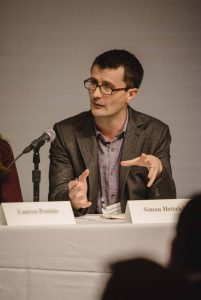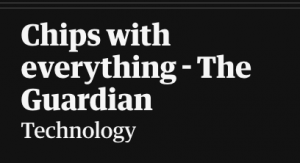Dr Ian Gwinn writes for The Conversation about his oral history project exploring the impact of 2-Tone music on people from Dorset…
How 2-Tone brought new ideas about race and culture to young people beyond the inner cities
Ian Gwinn, Bournemouth University
This Town, Peaky Blinders creator Steven Knight’s latest drama for the BBC, brings to life a defining – if short-lived – era in the history of British youth culture and popular music. Set in the West Midlands against the backdrop of industrial decline and social unrest in the early 1980s, the drama unfolds to the syncopated sounds of 2-Tone.
A furious mix of punk and Jamaican ska, 2-Tone became a genuinely national phenomenon, bursting out of a bedsit in Coventry and into the charts and the popular consciousness.
We know a lot about the urban multiracial landscapes of its Midlands origins, out of which its twin ideals of racial unity and musical hybridity sprang. But we know much less about how it resonated with the experience of young people beyond the big towns and cities.
Such considerations are timely. It is now 45 years since the founding of 2-Tone Records by Jerry Dammers, organist and songwriter for ska’s most famous band The Specials, and mastermind of the whole movement.
Of course, 1979 was also a decisive year for politics in the UK. But bands like The Specials did more than just soundtrack the civil strife of the early Thatcher years; they actually inspired political and cultural change.
To understand how they did so is important not only for historical reasons. A deeper sense of how anti-racist and multicultural ideas have shaped less culturally diverse regions may enrich contemporary debates over racism, particularly rural racism, which have become increasingly polarised.
My own ongoing oral history project with people from the Dorset region registers the powerful effect 2-Tone had in less racially mixed areas. Interviewees speak vividly of the energy, excitement and unruliness of attending gigs, as well as the sense of shared community, belonging and togetherness.
Nobody is special
As The Specials’ first single, Gangster, hit the airwaves in the summer of 1979 and the first 2-Tone tour opened in the autumn (with support from fellow labelmates The Selecter and Madness), a growing legion of youth clad in slim-fit mohair “tonic suits”, pork-pie hats, and black-and-white checkerboard greeted the bands as they made their way across the country. By the time all three bands appeared together on Top of the Pops that November, 2-Tone had swept the nation.
The Specials, in particular, built an ethos on the idea that “nobody is special”, refusing the division between band and audience (symbolically represented in the audience joining the band on the stage for the final numbers).
The inaugural tour covered the length and breadth of the country, reaching musical outposts like Aberdeen, Ayr, Blackburn, Bournemouth, Plymouth and Swindon. A seaside tour followed in 1980, winding its way through several English coastal towns, from Blackpool to Worthing.
One interviewee described how 2-Tone bands made a big deal of moving out into the remote areas and bringing the music to the people. That made them more accessible, setting them apart from other bands of the period.
For one fan from Weymouth, travelling up to that first Bournemouth gig was a powerful unifying experience:
You just didn’t realise that you were part of a bigger thing…When you get in there and everyone’s got the same attitude, the same outlook, the same sense of purpose and sense of place – it was really quite an amazing feeling.
Playing venues in far-flung places was part of the 2-Tone mission. For Dammers and others, the anti-racist message was aimed directly and primarily at white youth. These 2-Tone bands sought to reach audiences with a visual and aural display of unity. The symbolism had a profound impact. As another interviewee recalled:
Groups were either all white or all black…2-Tone was the first thing where you actually saw white and black musicians on stage together…That was a massive difference.
But not everyone suddenly became a staunch anti-racist. Some simply went for the music, the dancing and the good times. But for others the unity of politics, style and music cut across divisions among fractious youth cults and against far-right influences. Embracing the spirit of 2-Tone gave rural and small-town youth a way of expressing anti-racist politics in a more local idiom.
Race and racism today
Despite the contribution of 2-Tone – and before it, Rock against Racism – to anti-racist struggles, issues of racism have never gone away. The fight against far-right nationalism and police brutality continues, but increasingly the spotlight has shifted towards the more subtle and unseen ways in which racism is perpetuated. This ranges from everyday microaggressions to the lingering shadow of Britain’s imperial legacy, attracting a strong backlash in some quarters.
Recent evidence of rural racism, for example, has been met with swift dismissals. The former home secretary Suella Braverman was quick to deny others’ experience of racism, stating that the claim the countryside is racist is one of the most ridiculous examples of left-wing identity politics – just because there are more white people than non-white people somewhere does not make it racist.
Recalling the example of 2-Tone and The Specials may encourage a longing for a simpler time, when racists were easy to spot; things are more complicated today. Still, it can help us to understand how racial solidarities are forged, particularly in and through social and geographical differences. For my interviewees, 2-Tone’s ska revival was not a passing fad; it allowed them to reinterpret their own experience of class, race and locality.
If only for a moment, 2-Tone mania ruled Britain, in the words of the music critic Simon Reynolds. But as This Town shows, its rich and complex legacies can still be brought powerfully to life in the present.![]()
Ian Gwinn, Senior Lecturer in Politics, Bournemouth University
This article is republished from The Conversation under a Creative Commons license. Read the original article.















 SPROUT: From Sustainable Research to Sustainable Research Lives
SPROUT: From Sustainable Research to Sustainable Research Lives BRIAN upgrade and new look
BRIAN upgrade and new look Seeing the fruits of your labour in Bangladesh
Seeing the fruits of your labour in Bangladesh Exploring Embodied Research: Body Map Storytelling Workshop & Research Seminar
Exploring Embodied Research: Body Map Storytelling Workshop & Research Seminar Marking a Milestone: The Swash Channel Wreck Book Launch
Marking a Milestone: The Swash Channel Wreck Book Launch ECR Funding Open Call: Research Culture & Community Grant – Application Deadline Friday 12 December
ECR Funding Open Call: Research Culture & Community Grant – Application Deadline Friday 12 December MSCA Postdoctoral Fellowships 2025 Call
MSCA Postdoctoral Fellowships 2025 Call ERC Advanced Grant 2025 Webinar
ERC Advanced Grant 2025 Webinar Update on UKRO services
Update on UKRO services European research project exploring use of ‘virtual twins’ to better manage metabolic associated fatty liver disease
European research project exploring use of ‘virtual twins’ to better manage metabolic associated fatty liver disease